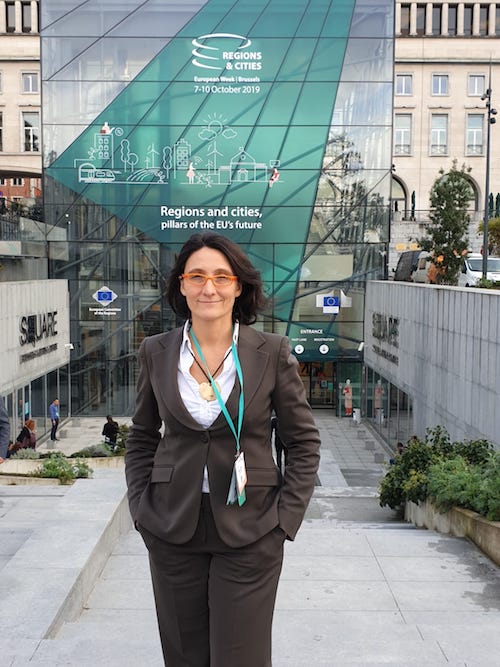- 72 experts (out of 159 applicants) representing different regional and local authorities from 23 European countries joined the session “A place-based approach to innovation ecosystems: why context matters” at the European Week of Regions and Cities last 9th October in Brussels.
- Dr Claudia Trillo, Reader in Architecture at the University of Salford, presented the study “Place-Based Innovation Ecosystems: Boston-Cambridge Innovation Districts”, published in 2019 as report of the Joint Research Center of the European Commission.
- This report aims to inspire European policy makers willing to support local and sustainable economic strategies, by leveraging the potential of innovation districts in cities.
The report “Place-Based Innovation Ecosystems: Boston-Cambridge Innovation Districts” is available at http://publications.jrc.ec.europa.eu/repository/bitstream/JRC116173/jrc116173_final_jrc_report_-_boston_case_study_pdf_final.pdf

The report stems from a collaboration with the European Joint Research Center, whose mission is to support European Union policies with independent evidence.The Boston Innovation Ecosystem case study has been now included in a wider comparative study conducted by the Joint Research Center as one of the five models for place-based innovation ecosystems.
The report has been presented by Dr. Claudia Trillo from the University of Salford on invitation of the Joint Research Center at the European Week of Regions and Cities, annual event that usually gathers +6,000 participants and in 2019 hosted +9,000 attendees.
The report is aimed at informing local and regional decision makers decisions on how to deliver successful innovation place-based strategies. It draws from the findings of a project named MAPS LED, Multidisciplinary Approach to Plan Smart Specialization Strategies, total budget € 1,512,000, financed by Horizon 2020, the main programme of the European Commission supporting research. The University of Salford was one of the four partners in this project, with a team led by Dr. Claudia Trillo as Principal Investigator and including Dr. Athena Moustaka, Prof. Erik Bichard, Prof. Yusuf Arayici, Dr. Mohammed Agbali, Clare Devaney, Mohammed Gabr, Bernard Nzau and Usman Bello. More details are available at the Cordis official website:
https://cordis.europa.eu/project/rcn/194342/factsheet/en
The study on Boston identifies the key success factors in the Boston innovation ecosystem.
It discusses how the Boston innovation eco-ecosystem is composed by a variety of interconnected innovation ecosystems involving key-actors from various sectors and operating at different scales, from the local to the international.
The physical infrastructure that enable such a successful place-based innovation is the city, and more specifically some targeted areas, i.e. the Innovation Districts.
Innovation Districts are walkable areas, rich in social life and public spaces facilitating informal knowledge exchange and mutual support, enabling the interconnection across innovators from different areas of expertise and sectors.
In Boston, Innovation Districts are situated in different contexts, from the most competitive areas such as Kendall Square adjacent to the Massachusetts Institute of Technology to deprived areas such as Roxbury.
Key-actors, such as the nonprofit organization Venture Café, bridge the gaps across different areas and make sure that socio-economic benefits produced from the innovation ecosystem are spread within the local entrepreneurs and communities. Evidence from the Boston case study shows that there is not a single magic recipe for the successful implementation of place-based strategies. Some of them are orchestrated by the city, some other by private actors. However, key-actors from industry, education institutions, public sector and from the wider community shall collaborate to make the whole ecosystem successful and main orchestrators shall value innovation as catalyst for local development.
Do you think that Manchester is a successful innovation ecosystem? Please send us your comments and feedback: C.Trillo2@salford.ac.uk.